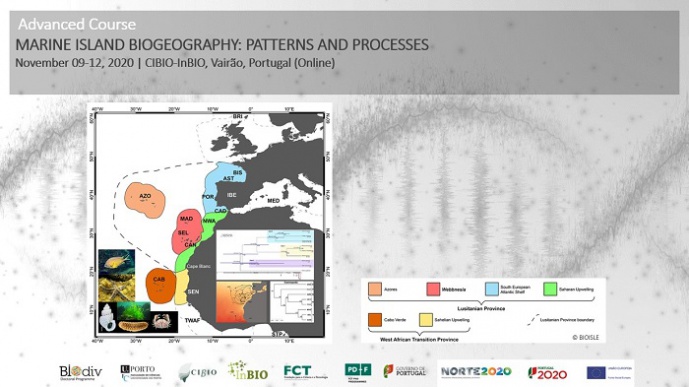Marine island biogeography: patterns and processes

Marine island biogeography is one of the most exciting topics in present-day research on insular biology. Topics explored over the last fifty years have featured: mechanisms of speciation on islands; mechanisms related to the arrival to and posterior morphological change on islands, such as founder effects, genetic drift and bottlenecks; models of species’ evolution on islands, such as the taxon cycle as well as adaptive and non-adaptive radiation; species–area relationships, species abundance distributions, spatial patterning and habitat diversity; species traits; island assembly theories and ecosystem functioning; the effects of island ontogeny on species diversity; the development of neutral models inspired by island theory; and unifying models.
There is considerable motivation for a more comprehensive theory of marine island biogeography capable of unifying ecological and evolutionary (historical) processes. There is also a need for expansion of island biogeography theory to integrate marine systems. To accomplish both tasks, a holistic approach is necessary, capable of integrating scientific disciplines as diverse as taxonomy, biogeography, marine biology, volcanology, sedimentology, stratigraphy, palaeontology, geochronology and geomorphology. Recently, the course instructors made such an attempt, and incorporated a wide range of historical and ecological variables acting on reefless volcanic oceanic islands, which previously had not been correlated to any extent. Such factors/variables include sea-surface temperatures (SSTs), time, evolution, speciation, bathymetry, ecological zonation, the life-expectancy of a species (at the geological scale), modes of larval development, species’ dispersal strategies, geographical range, sea-level changes, glacial-interglacial periods, sediment distribution on insular shelves, and the importance of the marine substrate for species turnover. However, several important questions remain largely unanswered. What was the worldwide impact of Pleistocene glacial-interglacial episodes and their associated sea-level variations on the shallow marine fauna and flora of volcanic oceanic islands? What are the main factors that explain the present-day marine biodiversity around volcanic oceanic islands? At what time and spatial scales do these factors operate? Elucidation of these questions is the chief aim of this course, that also introduces the students to the Sea-Level Sensitive (SLS) dynamic model of marine island biogeography.
PROGRAMME
MONDAY – José Madeira (IDL/FCUL) & Rui Quartau (IH)
09:30 - 11:00: Plate tectonics. Geological evolution of volcanic oceanic islands: the island ontogenic states.
11:15 - 12:45: Uplifting and subsiding islands. Megalandslides and megatsunamis. Examples from the Macaronesian archipelagos.
13:30 - 15:00: The creation of island shelves and their main drivers of evolution. Wave erosion and eustatic changes; subaerial erosion, volcanic progradation, Sedimentation, Mass-wasting; Tectonics, Uplift/subsidence.
15:00 - 16:30: The morphology of insular shelves as a key for understanding the geological evolution of volcanic islands: examples from the Macaronesian archipelagos.
TUESDAY – Sérgio P. Ávila (CIBIO-Açores)
09:30 - 11:00: Introduction to Island Biogeography. Early fundamental authors and papers in island biogeography. Definition and basic concepts: dispersal, vicariance and staging posts, geodispersal and plate tectonics, barriers, filters, sweepstake routes, centers of origin and centers of redistribution.
11:15 - 12:45: Biogeographical processes: maintenance, distributional change/climate change and origination processes. Main marine processes and patterns of dispersal, colonization and speciation on islands. The importance of stepping-stones.
13:30 - 15:00: A terrestrial perspective of island biogeography: the McArthur & Wilson’s (1964, 1967) Equilibrium Model of Island Biogeography (EMIB).
15:00 - 16:30: Island species-area relationships.
WEDNESDAY – Sérgio P. Ávila (CIBIO-Açores)
09:30 - 11:00: The General Dynamic Model (GDM) of Whittaker et al. (2008, 2010). The Glacial-Sensitive Model (GSM) of Fernández-Palacios et al (2016).
11:15 - 12:45: Evolution on islands: allopatric and sympatric speciation, adaptive radiation and phylogeography. The taxon cycle. Founder effects, genetic drift and bottlenecks. Ecological release and niche shifts.
13:30 - 15:00: Palaeobiogeography. Geological change, climate change and biogeographic patterns. The punctuated equilibrium.
15:00 - 16:30: Defining areas in palaeobiogeography. Biogeographic units and areas of endemism.
THURSDAY – Sérgio P. Ávila (CIBIO-Açores)
09:30 - 11:00: Island Biogeography: a marine perspective. The role of taxonomists and the importance of quantitative data for palaeobiogeography.
11:15 - 12:45: Main evolutionary drivers of oceanic islands’ marine biodiversity: littoral area, age and latitude. The impact of glacial and interglacial episodes on the marine insular shallow-water fauna: extirpation, extinction and documented geographical range expansions and contractions. Deep-time climate changes.
13:30 - 15:00: The Sea-Level Sensitive (SLS) dynamic model of marine island biogeography: palaeontology’s contribution for a global marine biogeographic theory.
15:00 - 16:30: State-of-the art and future lines of research on marine island biogeography
Total of 25h
COURSE INSTRUCTORS
Sérgio Ávila | CIBIO-Açores/BIOISLE/MPB-Marine Palaeontology and Biogeography
Rui Quartau | Instituto Hidrográfico
José Madeira |IDL/Faculdade de Ciências, Universidade de Lisboa
INTENDED AUDIENCE
The course will be open to a maximum number of 25 participants.
SELECTION CRITERIA
75% of available student slots are reserved for BIODIV students.
Priority will be given to:
• 1st year and other PhD students attending the BIODIV Doctoral Program;
• PhD students attending other courses;
• Other post-graduate students and researchers.
REGISTRATION
Participation is free of charge for BIODIV students | 80 € (students) | 150 € (other participants). CIBIO-InBIO members will have an additional discount of 20%.
Registration deadline: November 04, 2020
All applicants will be notify about whether they are accept until November 05, 2020
Please note that new rules apply for all BIODIV students.